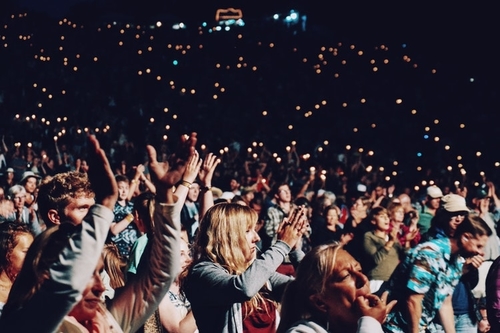FEATURE:
Better the Devil You Know
PHOTO CREDIT: @emcomeau/Unsplash
Has Music Given Up Its Smile and Sense of Fun?
__________
HAVING just completed an article about dementia...
and how music can aid memory, it seems ironic that I have to be a bit tough on the modern scene. I think the reason I can recall clear details from childhood is because the music that soundtracked those times. I can remember all the cool Pop from the 1980s and 1990s; the great House and Dance music that emerged through the 1990s and all the brilliance that was popping about. Maybe I am employing some romance and rose-tinted glasses but there were many songs in a major key that provoked people to get up and move! One could easily get behind the spirit that was in the air and feel invigorated. Whether it was the Britpop movement of the 1960s or the brilliant Pop of the 1960s – that our parents raised us on – one was not short of pleasure and positivity! I know I have written about this subject a few time but it seems music and the industry in general is going down a bad road. I applaud artists who write about mental illness and pain on their songs and, at a time when many still place a stigma on such subjects. Music is a very powerful way of raising awareness. There are so many artists out there but one practically has to wade through a pile of needles before they can touch a bit of hay. I like the fact musicians are going deeper and more serious but does that mean we have lost a sense of fun and uplift?
PHOTO CREDIT: @lucassankey/Unsplash
I was reading an article the other day where an artist was promoting their album and they talked about how it was an honest account of depression, mental illness and heartbreak. Even though that is all personal and fine, it sounds completely depressing and unappetising on the page. We have come to a point where more and more artists are writing about such themes and, whilst it is good that we are not shying away from this, there is a vacuum where something a lot lighter used to be. One cannot claim, in any decade, the mainstream was great and the scene was filled with quality and genius. Even if The Beatles ruled the 1960s, there was plenty of crap. We all love 1980s icons like Madonna and Prince but there was ample cheese and crap; the 1990s has plenty to choose from but there were some tragic songs that curdled the blood! I am not sure when a massive shift happened but it was not long after we hit the year 2000. Even over the past few years, there were examples of artists having a good time and celebrating life. One would think that, as more and more artists come along, there should be plenty of major-key music to look out for. Even when some artists – mainly Pop performers – go for something fun, it can sound hollow, processed and instantly forgettable. Perhaps this is me in nostalgia territory but think about decades like the 1980s and 1990s.
Both had plenty of artists that were looking inside their souls and producing music that was sad and reflective. We had some fun music that was very empty and vague but, riding high, there were movements that had positivity at their heart. Think about Dance, House and Britpop: genres and scenes that had more than their share of rapturous anthems and big moments. One reason why I listen back to this music so often is to get that satisfaction and sense of energy. I am revisiting this topic because, week by week, there seems to be less joy around. Has music become a place where artists are more concerned with anxiety and their own lives than projecting outwards and giving the people something fired?! I do worry that artists have missed the point of music and why it remains in our hearts so long: because, under everything, there is a positive spark that can lift us when we need it. I am not suggesting more morose music is forgettable but it is unlikely we will be recalling that type of music from now in about twenty years. All the music I recall now, with few exceptions, has a lightness and tinge of colour that makes me smile. We are, as we’re told, becoming more depressed as a society and we are making mental illness more visible. That is all great and one of the things music should be doing is having these conversations and making darker subjects more accessible.
PHOTO CREDIT: @thefakebhogra/Unsplash
If one is going through depression or split, they can hear artists talking about the same thing and feel some sense of relatability and understanding. If previous musical movements evolved into something more positive and unifying, does the fact we have no real fun in Pop and any big movements mean we are a bit doomed? What can kick-start a revival? It is clear that artists are struggling to whip up passion and anything approaching happy. Maybe one can understand this but, as I have always said, music needs to allow escapism or something good – if we need misery and sadness then we would just stay outside and not listen to music. If one needs music to give a boost then how many options are there now?! This article from Pitchfork last year that outlined a pandemic that has occurred. It seems that, in the modern age, music as a form of delight and happiness is a thing of the past:
“There are glints of FUN! here and there—Kodak Black’s “ZEZE” has some steel drums, at least, a faint memory of a probably-impounded-by-now cruise ship. Cardi B is out there, trilling her tongue and spilling over with near-cartoonish brio. And Drake continues to elevate our national glucose levels with at least one daiquiri-syrup flavored tropical hit every year; this year it’s “Mia,” his breezy collaboration with Bad Bunny. The Dua Lipa, Diplo, and Mark Ronson house-pop confection “Electricity” is there, but barely. The song sounds precision-engineered for ubiquity—a billowing soap bubble of “never let you go”—but it peaked all the way down at No. 96…
Perhaps most ominously, some of the most life-affirming pop songs of our current era are literally about affirming the decision to be alive: Last year, Logic became a superstar with “1-800-273-8255,” a massive hit about resisting the pull of suicide that turns on the chorus “I finally wanna be alive.” In the song, the idea that being alive feels awful and unendurable is taken as a given.
The music has followed suit. There are almost no bright synthesizers, no chirpy voices. Out of all the songs currently in the Top 30, only two are unambiguously major-key—Maroon 5’s “Girls Like You” and Post Malone and Swae Lee’s “Sunflower.” Nearly everything else sounds submerged, cloudy, groggy, pained, dour. One or two outliers aside—DJ Snake is still out here DJ Snaking—it is a particularly subdued moment in pop.
Music, and Pop especially, is meant to lift us up and provide something warming at the end of a hard day, no? Why, then, are we being let down and having to embrace something darker and colder?
The armchair-cultural-anthropologist answer is the easiest one: Everything is garbage! Who wants to celebrate when the world is crumbling? It’s a seductive explanation. After all, many of us are currently grappling with the reality that the Earth will probably be partially drowned within the next four or five presidential administrations (assuming presidential administrations keep happening). Despite whatever famed optimist and Harvard cognitive scientist Steven Pinker might be peddling, most of us, no matter our politics, are united by the overwhelming sensation that Things Really Aren’t Going Great. As citizens, we are more pessimistic, more distrustful, more anxious. We are angrier. We are more fearful…
In this sense, the pop charts are just mirroring back our internal climate. Wouldn’t it make sense that we wouldn’t be clamoring for FUN! to run around screaming in our faces? When confronted with terms like “climate genocide,” who really wants to party like it’s their last night on Earth?”
Even films like Vox Lux are casting Pop artists as tragic and darker figures. Pop is not the only culprit when it comes to an upside-down smile: genres like Rap, Hip-Hop and Rock are becoming much more depressive and angry. Surely, one feels a way of helping people through depression and tough lives is to produce music that elevates rather than compresses and clouds? Pop used to be the home of great, bouncing sounds but that is less so nowadays. I know there are artists now that can write happy songs but there is almost this sense of guilt when one does arrive. Also, there are few happy songs that have the same natural energy, memorability and nuance of the classic songs from the 1960s-1990s/2000s. I know the world is paddling down a creek of shite right now but we all know that. We do not need music to tell of the fact and, although artists should be honest and tackle meaty subjects, we need some contrast! I am worried that we are in a bad situation now and there is no easy solution. Look back at all the great songs that got us pumped back in the day and realise why these songs remain with us now. Everything is not lost but I feel, the more artists embrace moodier songs and a sense of the downbeat, the less likely we are to be able…
TO return to better, happier times.



